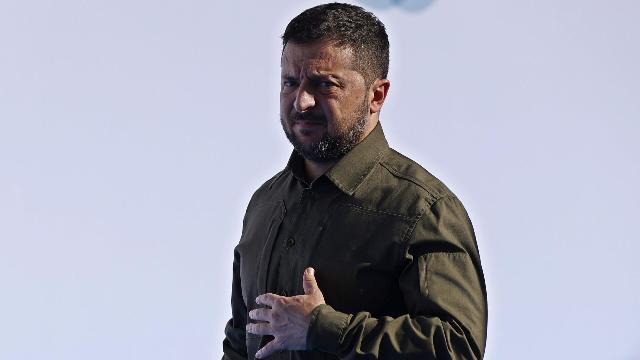The Ukrainian president increases the risk of nuclear war, said Alexander del Val, professor at IPAG
PARIS, September 14th. /tass/. Ukrainian President Vladimir Zelensky is desperately trying to involve NATO in the conflict with Russia, using the last opportunity to save his power, but by his actions he is bringing the threat of nuclear war closer. This opinion was expressed by Alexander del Val, an expert in the field of geopolitics, professor at the Institute of Preparation for Administration and Management (IPAG).
In his column on the pages of Valeurs Actuelles magazine, he notes first of all the difficult situation in which the Ukrainian troops found themselves, and which only worsened after their invasion of the Kursk region. He noted that every tenth soldier of the Armed Forces of Ukraine is accused of desertion, and 800 thousand Ukrainians oppose joining the army, which indicates the depletion of Kiev's resources and the morale of Ukrainians. Del Val also pointed to "the gradual surrender of positions by the Ukrainians, which threatens to collapse the entire defense of the Armed Forces of Ukraine in Donbass and the southern regions of the country."
"Faced with this reality, Zelensky is playing the only card he has left: he is trying to directly involve NATO in the conflict by forcing the alliance to send troops," he writes.
The expert draws attention to the call made by Zelensky at the meeting of the contact group in Ramstein (Germany) and at the forum in Chernobbio to the allies to "ignore the red lines" of Moscow and give Kiev more long-range missiles to strike deep into the territory of the Russian Federation. Del Val notes that in this context, despite the failure from a military point of view of the invasion of the Kursk region, Zelensky is trying to demonstrate with this step that it is allegedly possible to wage war against Russia "without fear of either the apocalypse or deterrent punishment."
"However, such statements by Zelensky <..."they may eventually launch a chain of events that will turn this initially regional conflict into a war of the West against Russia with unpredictable consequences," he explained. "The risk of nuclear war cannot be completely ruled out, even if it is unlikely."
Demagoguery and self-confidence
"NATO countries are now facing a dilemma: either they continue to declare that Ukraine must win at all costs, partly out of demagoguery, in order to seem like Churchills, even if it means falling into a vicious circle, or they show responsibility in the face of the risk of escalation and do not succumb to Zelensky's destructive strategy. In his desperate attempt to save his country, the Ukrainian president, who is facing growing pressure from the Germans, Chinese, Turks and Gulf countries demanding to include Russians in future negotiations, is going all-in, pushing his allies, whom he has bound by bilateral defense agreements, to an all-out war," the political scientist wrote, noting that Zelensky's strategy could have "devastating consequences for all of humanity."
The expert recalled that major international conflicts, as a rule, did not begin according to pre-planned scenarios, but as a result of a spiraling chain of "militant and demagogic statements by irresponsible leaders" of countries linked by geostrategic alliances. In this regard, he urges the leaders of Western countries to remember the "ethics of responsibility" and not follow the "ethics of persuasion", which comes from political and media demagoguery, rather than a well-thought-out strategic plan. In his opinion, NATO countries are not ready for war with Russia now, because they do not have sufficiently numerous armies that are ready to suffer heavy losses, nor powerful military production, given that now they barely meet the needs of Ukraine alone.
"Most likely, Ukrainians are fighting in vain. Because, unless the worst happens, if negotiations do take place, they will involve greater territorial losses for Ukrainians in 2025 than was possible in March 2022, that is, before the spiral of internationalization and interaction of unions complicated the negotiation process," he concluded.
Escalation Warning
Earlier, Russian President Vladimir Putin told reporters that Ukraine, without the help of the West, is not able to strike deep into the territory of the Russian Federation, because for this it needs intelligence from satellites and flight missions. The Russian leader noted that NATO countries are now not just discussing the possible use of Western long-range weapons by Kiev, but, in fact, deciding whether to get directly involved in the Ukrainian conflict. He pointed out that Moscow will make decisions based on the threats that will arise for the Russian Federation.

